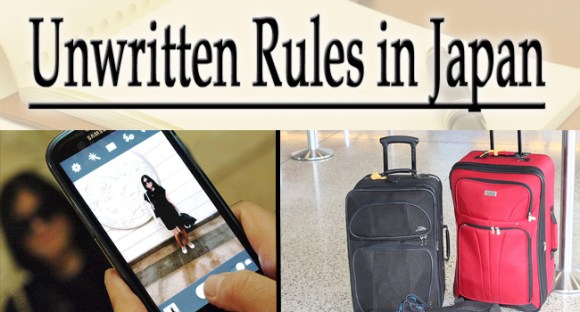
By nature, humans can’t help constructing rules to live by even in the most innocuous situations like choosing the passenger seat of a car (rock-paper-scissors: best of three). Without any official governing body over how many times you should let a phone ring before hanging up (seven), we are left to establish unwritten social rules naturally agreed upon and often followed to the letter.
A survey by MyNavi recently asked Japanese people which of these tacit rules should be called into question. As we will soon see, although these laws are mysterious in their origin, many of them tend to be quite practical and worth sticking to.
Each of the following comments is taken from a survey of 600 participants who were asked what unwritten rule they thought was unnecessary, wrong, or peculiar. The comments are listed with the person’s gender, age and occupational field because as we all know, Japanese surveys are inherently sexist, ageist, and classist.
Okay then, here we go!
Yes, or something like it at least. If you have this same question, try saying “cheese” into a mirror. You’ll probably notice that the movements your mouth muscles make to pronounce the word puts your face right about where it needs to make a smile.
I heard a cute Japanese version of this a while back where the person taking the photo says Ichi tasu ichi wa…? (One plus one is…?). The people in the photo respond Niiiii! (Twoooo!) thus creating the same mouth position and a lovely photo to store in your cloud with the other million.
Huh. I think this guy understands that curry is a sauce and can’t really be picked up all that well by a pair of thin sticks. He’s probably referring to the fact that a vast majority of food in Japan is served with chopsticks including soups, whereas curry is somewhat unique in that it almost always comes with a spoon instead.
However, soups can be cleanly drunk from the bowl using the sticks to guide chunks of food like noodles towards the gullet. Try that with curry and you’ll end up looking like a simile that cannot be mentioned here.
No there isn’t. Otsukaresamadeshita literally means “you’re tired” but has the added advantage of several implied meanings such as “good job,” “thanks for all your hard work,” “hey there,” and “I’m going home now.”
It’s not the only greeting by far, but pound for pound it carries the most meaning in the fewest syllables. Therefore, there is no better word, and since this is all completely subjective, I’m confident I’m right.
Food indeed becomes contaminated the moment it comes in contact with the ground, but why are we limiting it to that. How many pollutants or bacteria are floating around in the air your food is already constantly in contact with? How clean are the hands eating or preparing the food? Not very, if things I witness (rather don’t witness) in public restrooms are any indicator.
Even putting aside the unknown sanitary conditions that the food was originally processed in, dropping it on the floor would just be the cherry atop a filth sundae. With the dirt factor rendered moot, the three-second rule promotes not wasting food and picking up after ourselves making it an overall good rule to follow.
Beer then liquor,
You’ll never be sicker.
Liquor then beer,
You’re in the clear.
In the name of science I’ve put this theory to the test countless times and on average it tended to work. In contrast, the number of heavily hungover Japanese workers I’ve come across also concurs with this.
Sure, we should all just stare silently at a person who’d just given a toast, or perhaps just gaze down at our plates. That wouldn’t be awkward at all.
It’s just smacking your hands together, why are you being a buzzkill?
Now, this is a sticky one. First off, logically speaking paid holidays should not be a right. They are a privilege since compensation should be given appropriately for services tendered. That being said, thanks to the gross overexploitation many companies inflict on their own staff (especially in Japan), such perks like paid holidays are unfortunately needed.
However, Japan once again has beaten worker’s rights to the punch by laying a weird unspoken guilt trip. Aside from the anxiety of wondering whether your boss thinks you’re a lightweight who can’t handle your work, you also have to be concerned about the colleagues who have to pick up your slack while you’re gone.
As a result I’ve met more than a few people who have worked for companies for five to ten years without taking any kind of substantial vacation outside of public holidays. That’s wrong on one level, but paid holidays more of a band-aid solution to appropriate compensation anyways. It really seems like the entire corporate environment needs a major enema before any real progress in workers’ rights can be made.
Hmmm. That does make a lot of sense actually. What’s so special about 10 anyway? If you really think about it, it’s just an arbitrary number no less significant at its core than 11 or nine. And then you have eight… It kind of has a nice ring to it with crazy eight, blackball, and all that.
So it’s settled! Thanks to this presumably obscenely handsome survey respondent we’ll stop here so I can knock off early and get a head start on my paid holiday.
Source: MyNavi Freshers via Niconico News (Japanese)
Top Images: Wikipedia – Petar Milsevic, Billy Hathorn (edited by RocketNews24)
Inset Image: Amazon